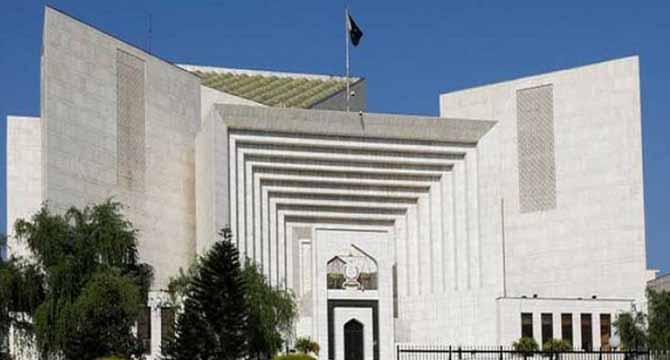ISLAMABAD , June 13, 2023: The Supreme Court on Tuesday accepted Pakistan Tehreek-e-Insaf’s plea to become a party in the Election Commission’s review appeal against Punjab polls order, however rejected the request for immediate suspension of review of judgments law.
A three-member bench headed by Chief Justice of Pakistan Umar Ata Bandial conducted the hearing. The bench also includes Justice Ijazul Ahsan and Justice Muneeb Akhtar as its members.
PTI’s lawyer Barrister Ali Zafar requested the court to become a party, which was accepted by the Supreme Court.
However, the apex court rejected the request for immediate suspension of the Review of Judgments and Orders Act and adjourned the hearing till tomorrow (Wednesday).
The arguments of the lawyers against the review act will continue on Wednesday.
Chief Justice Umar Ata Bandial said that there was a big difference between appeal and review petitions. He remarked that now appeal and review had been made the same through the Act.
“Will there be an option to go for review against this appeal?, he asked. Justice Ijazul Ahsan said in a dialogue with Ali Zafar that he will have to satisfy the court.
Ali Zafar giving arguments said if such laws were made, there could be a possibility that govt would enact a second appeal law.
The Chief Justice said that in-chamber curative had been imposed in India, where it was reviewed on two grounds. “Don’t you think these matters should be handled with patience rather than haste?, the CJP questioned. The Chief Justice asked from the PTI counsel on whose behalf the petitions had been filed?
Ali Zafar said the petitions were filed by PTI leader Umar Ayub. He said the apex court had the power to review the decisions. He argued that Article 188 mentioned review and clarified its definition which was clear.
To a question about similarities in both laws, the petitioner’s counsel said that the review act was against Article 10-A, the review was also an interference in the independence of the judiciary and the purpose of the practice and procedure act and the review act was the same.
Justice Muneeb Akhtar said that both laws related to separate jurisdictions. The petitioner’s lawyer said that giving the right to appeal by mere legislation was against the constitution.
Ali Zafar argued that there was a concept of finality of the decisions of the Supreme Court, the evidence was not revisited in revision.
He said review jurisdiction could not be the same with that of appeal. He said that judges like Justice Darab Patel, Justice Fakhruddin G Ibrahim had given rulings on it. All these were heavyweight judges who were very clear.
The Chief Justice said that Article 188 also talked about Acts of Parliament, to which Ali Zafar argued that review and appeal had two separate jurisdictions. “The constitution does not provide for an appeal against a Supreme Court decision,” he said.The chief justice said that court had suspended a law but it could not suspend another.
Later, the Supreme Court adjourned the hearing of the Election Commission’s review plea against Punjab polls order and review of orders and judgments case till tomorrow (Wednesday).

